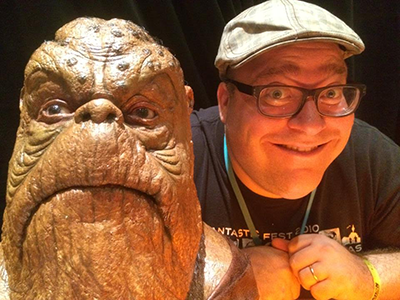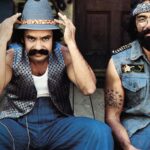Yeah, yeah, yeah. Anyone else bored with racism? And what, really, is the message of this film? That everyone is a racist asshole, so we ought to just accept it? This movie gets props for being so “real,” but you know what? I know a lot of black and white people who work together every day and manage not to fight and, in fact, manage to be friendly. Now, this movie does have some very well-played and well-acted scenes. But there are also a lot of really ridiculous scenes. Two of which are predicated on outrageously far-fetched coincidences, and one scene that has two back-to-back outrageously far-fetched reversals. In slow-mo. So what that means is that during this serious and award-nominated treatise on American culture I laughed loud and hard four times. Hardly the director’s intention. I proclaim this movie to be a joke — and, frankly, it isn’t that difficult to shock your audience into respect if you make your characters (thin, one-dimensional characters for that matter) say abusive things. Please do not confuse this with David Cronenberg’s brilliant and entertaining film of the same name.








There’s a reason AO Scott writes for the NY Times and I write for the SS Fun. Here is exactly what I thought of “Crash,” but eloquently put:
Bigotry as the Outer Side of Inner Angst
By A. O. SCOTT
hat kind of movie is “Crash”? It belongs to a genre that has been flourishing in recent years – at least in the esteem of critics – but that still lacks a name. A provisional list of examples might include “Monster’s Ball,” “House of Sand and Fog” and “21 Grams.” In each of these films, as in “Crash,” Americans from radically different backgrounds are brought together by a grim serendipity that forces them, or at least the audience, to acknowledge their essential connectedness.
The look of these movies and the rough authenticity of their locations create an atmosphere of naturalism that is meant to give force to their rigorously pessimistic view of American life. The performances, often by some of the finest screen actors working today, have the dense texture and sober discipline that we associate with realism. But to classify these movies as realistic would be misleading, as the stories they tell are, in nearly every respect, preposterous, and they tend to be governed less by the spirit of observation than by superstition.
This is not necessarily bad, and some of these movies are very good indeed. But in approaching “Crash,” we should be more than usually cautious about mistaking its inhabitants – residents of Los Angeles of various hues, temperaments and occupations – for actual human beings. This may not be easy, for they are played by people of such graven, complex individuality as Matt Dillon, Don Cheadle and Terrence Howard, as well as by less established but equally gifted actors like Michael Pena and Chris Bridges (better known to the world by his rap name, Ludacris).
Their characters – and the dozen or so others whose lives intersect in the course of an exceedingly eventful day and a half – may have names, addresses, families and jobs, but they are, at bottom, ciphers in an allegorical scheme dreamed up by Paul Haggis, the screenwriter (most recently of Clint Eastwood’s “Million Dollar Baby”), here making his directorial debut.
As he demonstrated to galvanizing effect in the “Million Dollar Baby” script, Mr. Haggis is not unduly concerned with subtlety. At a time when ambitious movies are dominated by knowing cleverness and showy sensation, he makes a case for blunt, earnest emotion, and shows an admirable willingness to risk sentimentality and cliché in the pursuit of genuine feeling. Many of the scenes in “Crash” unfold with great dramatic power, even when they lack a credible narrative or psychological motive.
Mr. Haggis’s evident sincerity and intelligence are reflected in the conviction of the cast, and may also leave an impression on the audience. So much feeling, so much skill, so much seriousness, such an urgent moral agenda – all of this must surely answer our collective hunger for a good movie, or even a great one, about race and class in a modern American city.
Not even close. “Crash” writes its themes in capital letters – Race, Class, Life, Fate – and then makes them the subjects of a series of speeches and the pivot points for a succession of clumsy reversals. The first speech, which doubles as introductory voice-over narration, is by Mr. Cheadle’s character, a detective named Graham, addressing his partner (and lover), Ria (Jennifer Esposito), after their car has been in a minor accident. He takes the event as a metaphor for the disjunctive, isolated character of life in Los Angeles, while she insists that it is merely a literal, physical occurrence that requires a practical response.
It does not take long to figure out whose side Mr. Haggis is on. Metaphor hangs in the California air like smog (or like the snow that is incongruously falling on the Hollywood Hills). The other major element in the atmosphere is intolerance. Ria, who is Hispanic, climbs out of the car and confronts the other driver, an Asian-American woman, and before long their argument has descended into racial name-calling. This sets the pattern for just about every other conversation in the movie.
In the next scene, which takes place earlier on the previous day, a hot-tempered Iranian shopkeeper is insulted by the owner of a gun store, who calls him “Osama.” And so it goes, slur by slur, until we come full circle, to the original accident, after which a few lingering questions are resolved.
In the meantime, quite a lot happens. Guns are pulled, cars are stolen, children are endangered, cars flip over, and many angry, hurtful words are exchanged, all of it threaded together by Mr. Haggis’s quick, emphatic direction and Mark Isham’s maundering electronic score.
Mr. Haggis is eager to show the complexities of his many characters, which means that each one will show exactly two sides. A racist white police officer will turn out to be physically courageous and devoted to his ailing father; his sensitive white partner will engage in some deadly racial profiling; a young black man who sees racial profiling everywhere will turn out to be a carjacker; a wealthy, mild-mannered black man will pull out a gun and start screaming. No one is innocent. There’s good and bad in everyone. (The exception is Mr. Pena’s character, a Mexican-American locksmith who is an island of quiet decency in a sea of howling prejudice and hypocrisy).
That these bromides count as insights may say more about the state of the American civic conversation than about Mr. Haggis’s limitations as a storyteller, and there is no doubt that he is trying to dig into the unhappiness and antagonism that often simmer below the placid surface of everyday life. “I’m angry all the time, and I don’t know why,” says Jean (Sandra Bullock), the wife of the city’s district attorney (Brendan Fraser), the day after their S.U.V. has been stolen at gunpoint.
Her condition is all but universal in Mr. Haggis’s city, but its avenues of expression are overwrought and implausible. The idea that bigotry is the public face of private unhappiness – the notion that we lash out at people we don’t know as a form of displaced revenge against the more familiar sources of our misery – is an interesting one, but the failure of “Crash” is that it states its ideas, again and again, without realizing them in coherent dramatic form.
It is at once tangled and threadbare; at times you have trouble keeping track of all the characters, but they run into one another with such frequency that, by the end, you start to think that the population of Los Angeles County must number in the mid-two figures – all of it strangers who hate one another on sight.
So what kind of a movie is “Crash”? A frustrating movie: full of heart and devoid of life; crudely manipulative when it tries hardest to be subtle; and profoundly complacent in spite of its intention to unsettle and disturb.
I’m with you on this one. I rented this a month ago, and hands down, it’s the worst movie I’ve seen since Kids or Bad Lieutenant. The script has more in common with Aesop’s Fables than Dog Day Afternoon — there’s nothing realisitc about all these contrived, forced meetings and coincidences.
The worst of it: no one, and I mean no one, talks like that. People may THINK like that on occasion, but no one, face to face, talks like that. I’ve lived in NYC since 1987, and I can count on one hand the times I’ve seen people be that racially/ethnically insensitive to each other, face to face. It just doesn’t happen all that much. To happen dozens of times in the course of a day or two? No.
And I couldn’t stand this creepy Hollywood version of REALISM, which seems to be forcing your “good” characters to do horrendous things, and your “bad” characters do uncharacteristically good things, so we could all ponder the magical moral ambiguity of life. Bullshit. The movie was needlessly coarse, best exemplified in Don Cheadle’s character, who racially insults his beautiful detective partner (Jennifer Esposito) after having sex with her. In no way would his character do something like that — we were given no clue that he would talk or act that way, and nothing else about his character suggested that he would say something like that.
And then we have Matt Dillon’s “bad cop” character … who finger-fucks a wealthy black woman on a bogus traffic stop that would have immediately had him and the city of Los Angeles sued for millions of dollars … hurls racial insults via phone at a black woman working the phone line of a HMO … but, wait a minute, it’s all because he really cares about his ailing father and is a little uptight. And not just that he then goes on to save the black woman he finger-fucked, purely by chance, the next day when she rolls her vehicle on the interstate — it’s not like we can think he’s a good guy alone because of his feelings for his father — we need him to save that woman from a burning car to prove this.
In a word: BULLSHIT. A campy, false, heavy-handed, poorly-written movie that’s a complete fraud. Which I wouldn’t mind at all, save it’s received critical raves in some corners and I’ve had more than a few people, whose sanity I now question, recommend it. If you want to work up a good head of steam over bad art, applied like a three-year-old scribbling with crayons on a living-room wall, rent this movie.
Yup, it’s a stinker. It reminds me of that song from Avenue Q, “Everyone’s a Little Bit Racist”. Except Paul Haggis’s version of the song is “Everyone’s Blatantly Racist”. (It’s not a good sign when you lack the subtlety of a puppet show.)
The only lingering question: why can’t Repsher badmouth this movie without also dissing Bad Lieutenant??
Just be grateful this didn’t set me off an anti-Cronenberg jag, as Naked Lunch held my “worst movie” mantle before Kids and Bad Lieutenant.
since haggis is on topic ill go ahead and dis million dollar baby, one of the more overrated movies in the last couple of years. mystic river too. clint really lost track with these, usually i dig his stuff alot.
While at times this movie seemed to be shouting LOOK, WE’RE ALL RACIST PIGS! at some points, I thought it was quite entertaining. Paul Haggis’ and Bobby Moresco’s script had some surprising twists, and the acting was pretty solid – especially from Don Cheadle, and Ludacris is a better actor than he is rapper. However, was it only me, or was the scene where Sandra Bullock tells her cleaning lady that she’s her best friend reminiscent of Jessica Tandy in “Driving Miss Daisy?” And Bill R., why the hate for Kids? The worst thing about that film was Leo Fitzpatrick’s face.